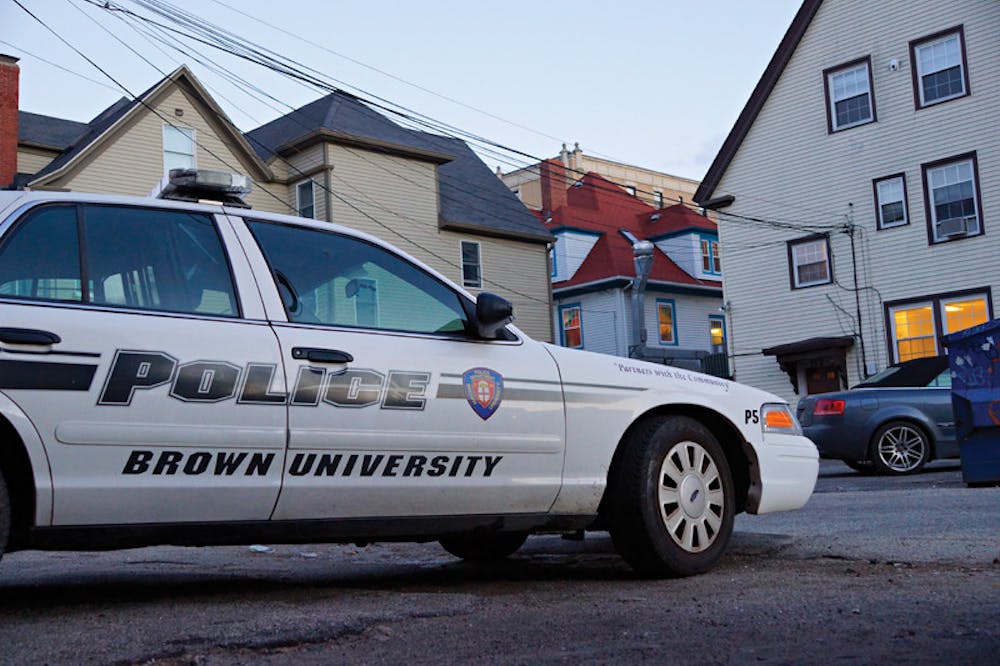The number of reported forcible sex offenses and robberies at Brown increased significantly from 2011 to 2012, while the number of reported burglaries fell by almost 50 percent, according to the 2013 Annual Security Report released by the Department of Public Safety last week.
The number of total reported crimes remained stable from 2011 to 2012.
The report includes statistics for nine types of criminal offenses, as well as information about arrests and disciplinary referrals for weapons, drug and liquor law violations.
There were 17 reported cases of forcible sex offenses in 2012, compared to seven cases in 2011 and nine in 2010, according to the report. All but one of these crimes occurred on campus.
Paul Shanley, deputy chief of police for the Department of Public Safety, attributed the increased number not to higher incidence but to more frequent reporting. Programs to boost awareness of sexual assault and available student resources could be raising the percentage of victims who report sex offenses, he said.
Despite the existence of these programs, sex crimes remain underreported, Shanley added.
Robberies also increased from 2011 to 2012, jumping from 11 reported incidents to 17. Only one of the reported cases occurred on campus, while the rest occurred on public property nearby.
That increase does not seem to have continued into 2013, Shanley said, citing “a 48 percent decrease in robberies” at this point compared to the same time last year. But Shanley added that there has been an “increase in the level of violence associated with the robberies,” despite the lower overall incidence.
Six students were arrested for drug violations and one student was arrested for a liquor law violation in 2012. No students were arrested for these reasons in 2011.
“Our officers came upon it more often than in years past,” Shanley said, adding that drug and liquor violations tend to fluctuate considerably.
Students are considerably more likely to receive disciplinary referrals to the Office of Student Life than to be arrested for these kinds of violations.
In 2012, there were two disciplinary referrals for weapons violations, 21 for drug violations and 38 for liquor law violations. Referrals for weapons and liquor law violations decreased significantly from 2011, while referrals for drug violations saw a slight uptick. A representative for the OSL did not return a request for comment.
Three reported cases of aggravated assault occurred in 2012, none of which took place on campus. Two cases were reported in 2011.
But not all types of crime examined in the report increased from 2011 to 2012 — the number of reported burglaries declined dramatically, dropping from 40 cases in 2011 to 23 in 2012. Shanley said DPS and the Office of Residential Life have made efforts to increase “community awareness” about simple precautionary practices to deter burglaries, such as locking doors.
But many students still do not take measures to increase room security. This semester, there have been at least nine reported cases of laptops stolen from unlocked rooms in residence halls, The Herald reported in weekly crime updates.
“We’re definitely going to increase our campaign in that area,” Shanley said.
There were no reported incidents of homicide, negligent manslaughter, non-forcible sex offenses, motor vehicle theft or arson in 2012. These statistics are consistent with those of 2011.
One incident defined as a hate crime took place in 2012 involving a text message sent to a student. The student reported the message to DPS but “declined to make a formal complaint,” Shanley said.
In addition to publishing the Annual Security Report, the department examines crime statistics weekly in order to measure the efficacy of its programs and determine the best allocation of resources, Shanley said. The Annual Security Report also serves as a way for the public to remain informed about campus and local crime.
DPS is federally mandated to report information about public safety annually in compliance with the Jeanne Clery Disclosure of Campus Security Policy and Campus Crime Statistics Act. The Annual Security Report includes information about certain DPS policies and programs, security provisions and safety resources for students, as well as rules for student conduct and incident statistics. The full report can be found on the department website.

ADVERTISEMENT




